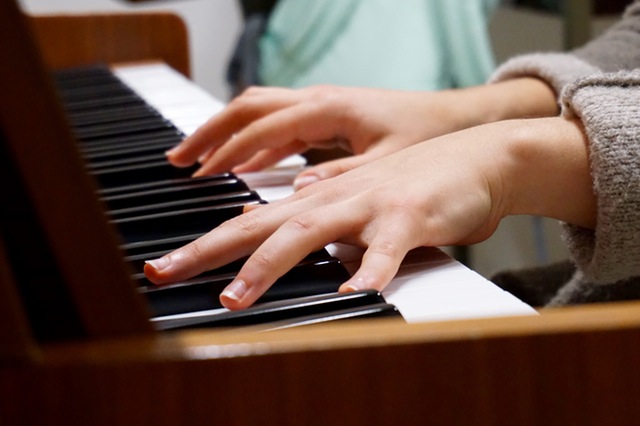Memory, sweet and persistent, swept open the door.
We sat on the piano bench in the sun room of her new home, fingers poised on the piano keys. Outside, the red, late-afternoon, winter sun perched precariously on the horizon. “I forgot how to play it,” she lamented, shrugging her shoulders, making herself appear smaller.
“Just watch my fingers, Mom. Do what I do.”
She simply frowned and, sighing deeply, turned away.
Looking back, I was disappointed at her reaction because that piano was the chief reason I’d selected this particular nursing home for her. She’d taken some lessons as a girl and knew how to play a handful of compositions: several American standards, a few raucous Polish pieces and one catchy exercise she’d taught me on a toy piano I had when I was a kid.
I have no idea whether or not that ragtag drill even had a name, but it was the tune I tried to get her to play on that tense afternoon. Actually, it was the only piano riff she’d taught me that I could still perform on a keyboard. And it was such an integral and fondly remembered part of my childhood that I had taught it to my enthusiastic son on his electric keyboard when he was young.
“That rules,” he’d affirmed.
I’d brought my mother to her new living quarters just a few days before. At the Admissions Director’s suggestion, I came to visit her daily during that first week. Thereafter, the plan was to slowly get her accustomed to the strange new faces in her life by reducing my visits to every other day, then twice a week, then once. I felt a stinging sadness about what I was doing, but without question it was time.
She was 88 by then, widowed for 13 years and exhibiting all the signs of a growing dementia. She’d get lost on the street, was no longer able to keep track of time (day, night, day of week), felt a nocturnal compulsion to hide personal items and then accuse “people”—me in particular—of sneaking into her apartment while she slept in order to mix up her stuff and confuse her. Panic.
Clearly, she could no longer live alone, and neither she nor I could afford the round-the-clock care she’d need in order to continue to stay in her own home. On top of that, my crumbling marriage could not take another stress, preventing her from living with me, her only offspring.
I finally reluctantly faced the trauma of every parent’s child who must carry out the deed—I went “home hunting.”
I found a facility with a large, attractive and comfortably furnished sun room. “All of our guests love this room,” a cheerful aide assured me. What caught my hungry eye in particular was the upright piano that served as the room’s centerpiece. Its presence convinced me that this was the right place for her. She’d again have her childhood piano to keep her company, maybe even make her happy.
The only problem: dementia had robbed her of her repertoire.
~
In order to understand how devastating her loss of music must have been, you had to know my mother. Helen loved the popular tune and would softly croon while cooking or cleaning or laundering—anything, really, that didn’t require silence. The windfall for me was that, to this day, I can identify almost any song from the 1930s and 40s. Given the opportunity, I’d have cleaned up on that old TV show, “Name That Tune.”
Compounding music‘s allure, my mother was an accomplished ballroom dancer who would one day claim a husband from the dozens of Fred Astaire wannabes who combed Manhattan dancehalls, like Arcadia Ballroom and Roseland Dance City, before World War II thinned out the crowd. My dad often told me of the spell she’d cast over nearly all of the dance floor lotharios.
“She was the best of the best,” he boasted, giving me a look to let me know that he was her preferred dance partner, body and soul.
One of my favorite “dancing-mom stories” takes place when she was 19 or so and employed by Pilot Radio, then a major American manufacturer; she worked on an assembly line, making condensers. One afternoon, the floor manager chose her and several other young women from her Brooklyn factory to go to Lawrence, Massachusetts, in order to train some local girls at a new Pilot branch that was to open there soon.
Terribly excited by the opportunity to leave the drudgery of their factory—albeit only temporarily, and for another dreary plant—my mother and her best work friend, Goldie, grabbed each other about the waist and gleefully jumped around.
“Be careful, girls,” the supervisor warned. “Lawrence is not Brooklyn.”
Two weeks later, after a hard day of Lawrence-trainee instruction, Helen and Goldie descended upon a local dancehall to unwind. At the time, savvy New York hoofers did the Peabody, a dance considered boldly sexual in some quarters. In it, facing partners held each other side-by-side, hip-to-hip and, accompanied by a kind of ragtime tune, traveled around the floor at high speed, dipping here and there like a rolling wave.
That evening, the Big Apple transients, faces painted with then frowned-upon-in-Lawrence lip and cheek rouge, raced across the floor in their eyebrow-raising glide. This act so thoroughly enraged the dancehall manager that he called the cops to eject them from the premises.
Whisked to the station house, they were chastised (and for all I know, booked) for brazenly displaying siren-loud makeup and engaging in what the court called an “immoral dance”; they were even shamed in the local newspaper the following day. I’ll admit it, though. I’ve always loved having an “ex-con,” with such a mildly rebellious offense, for a mother.
~
And so, as evening closed in on that February day, Helen and I sat on the piano bench where I made yet another clumsy attempt to get her used to the place. Truthfully, it was an adjustment for both of us. I put my arm around her shoulder, pulling her closer to me on the seat.
“Here. Watch my fingers,” I said, trying to avert her attention from a tear welling in the corner my eye.
It took a number of tries, but finally I played a bar and she carefully copied it; then another and she picked up confidence; then another. Before I knew it, she was banging out the piece solo. “I’ve got it!” she proudly and loudly exclaimed, sitting up taller, letting out a big belly laugh. “Look, Bobby!”
A sudden warm, peaceful embrace enveloped my body as I absorbed the wonder of my realization: she had once taught this melody to me, and here I was teaching it back—no, giving it back—to her. Oddly, my view of the scene gradually drifted overhead and I observed the two of us through what seemed to be a camera lens, slowly pulling up and away in the fading light, as if denoting the end of a movie.
In a way, that phantom camera shot did mark the conclusion of our story, but not in any mournful fashion. It served, instead, as my personal portal on a beautiful finale to our particular parent–child duet.
~
Author: Robert Danielenko
Image: Pexels
Apprentice Editor: Meghan Alton; Editor: Toby Israel
~







Read 0 comments and reply